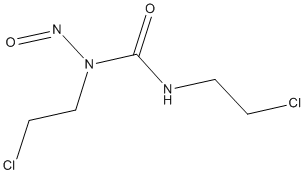All AbMole products are for research use only, cannot be used for human consumption.

Carmustine (BiCNU) is a cell-cycle phase nonspecific alkylating antineoplastic agent with ED50 ranging from 5.0 µM to 11.9 µM. It is used in the treatment of several types of brain cancer (including glioma, glioblastoma multiforme, medulloblastoma and astrocytoma), multiple myeloma and lymphoma (Hodgkin’s and non-Hodgkin). In a study, three lines with O6-AGT activity below 25 fmol/mg protein had carmustine ED50 values ranging from 5.0 µM to 11.9 µM.
| Molecular Weight | 214.05 |
| Formula | C5H9Cl2N3O2 |
| CAS Number | 154-93-8 |
| Solubility (25°C) | DMSO |
| Storage | -20°C, protect from light |
[4] Alison B Fleming, et al. Pharmacokinetics of the carmustine implant
| Related DNA Alkylator/Crosslinker Products |
|---|
| Illudin S
Illudin S, a cytotoxic Illudin, is a natural sesquiterpene with strong anti-tumour and antiviral activities. |
| Illudin M
Illudin M is a cytotoxic fungal sesquiterpene that can be isolated from the culture medium of Omphalotus illudens mushrooms. |
| Sibiromycin
Sibiromycin is a naturally produced glycosylated pyrrolobenzodiazepines (PBDs). |
| Mitobronitol
Mitobronitol (Myelobromol; DBM) is a brominated analog of mannitol, also known as an anticancer agent that is classified as an alkylating agent. |
| Duocarmycin analog-2
Duocarmycin analog-2 is a potent DNA alkylating agent. |
All AbMole products are for research use only, cannot be used for human consumption or veterinary use. We do not provide products or services to individuals. Please comply with the intended use and do not use AbMole products for any other purpose.


Products are for research use only. Not for human use. We do not sell to patients.
© Copyright 2010-2024 AbMole BioScience. All Rights Reserved.
